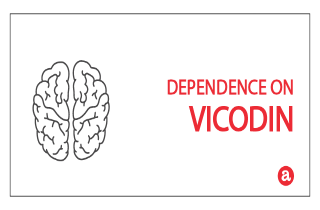Do you want to avoid becoming dependent on Vicodin (hydrocodone)?
Dependence on hydrocodone is expected to occur after long-term use of Vicodin resulting in symptoms of Vicodin withdrawal when you lower or stop dosage. And Vicodin tolerance builds up over time. Vicodin dependence can also develop quickly, especially if you are abusing your prescription and not using Vicodin as it was meant to be used. Here we’ll explore the difference between dependence on Vicodin and addiction and how to recognize both. plus, we invite your questions about Vicodin at the end.
Vicodin dependence vs addiction
Vicodin is a mixture of hydrocodone and acetaminophen. It is one of the most commonly prescribed medications to treat moderate to severe pain. So how is dependence on Vicodin different than Vicodin addiction?
Dependency on any drug means that when you stop taking the drug, you experience withdrawal symptoms. Dependence on Vicodin occurs when your brain and central nervous system have adapted to the presence of hydrocodone and need the drug in the body to operate normally. You can develop Vicodin dependence simply by taking the medication as prescribed, making it difficult to stop taking Vicodin. But you develop physical dependence faster when you abuse the drug and snort, smoke, or inject Vicodin into your body. So how is this different than addiction?
Addiction involves the presence of psychological symptoms such as drug seeking behavior, doctor shopping and thinking about Vicodin in unhealthy ways. And while being physically dependent will not necessarily mean you’ve become addicted to Vicodin, you will know if you are addicted to Vicodin if you try to stop taking it. During or after Vicodin withdrawal, symptoms of addiction can accompany dependency.
Vicodin dependence time: How long to be dependent on hydrocodone?
Even if you’re taking Vicodin as directed by your doctor, you can develop dependency on hydrocodone. This can happen as early as two to three weeks after you have started taking Vicodin. If Vicodin dependency occurs and you want to get off Vicodin, talk to your doctor to help you slowly wean off the medication. Also consider that Vicodin is a schedule III drug. So while hydrocodone combined with acetaminophen is safer than other drugs and pain relief opiate medications, this still means dependency and the potential for abuse is increased.
Dependence on Vicodin symptoms
A key indicator that you have developed Vicodin dependence is needing to take Vicodin in order to compensate for withdrawal symptoms. Withdrawal symptoms, in general, are another symptoms of a physical dependence.
Vicodin dependence withdrawal
Withdrawal happens because your body is seeking homeostasis without the presence of Vicodin. Withdrawal from Vicodin can be painful and uncomfortable but is very rarely dangerous. Depending on the severity of symptoms, however, it’s possible that inpatient treatment may be necessary to withdraw from Vicodin. And it is always recommended to go through a tapering process. General symptoms to expect during Vicodin dependence withdrawal include:
- agitation
- anxiety
- diarrhea
- mood changes
- nausea and vomiting
- runny nose
- sweats and chills
Physical dependence on Vicodin
Physical dependence on Vicodin is the physical need to take hydrocodone in order for the body to function. Over time, hydrocodone integrates into the brain chemistry in such a way that it needs hydrocodone to function normally. You can know if you’re dependent on Vicodin by the presence of withdrawal symptoms after you stop taking it. If you manifest withdrawal symptoms after lowering, missing or cutting out a dose of Vicodin, this means a dependency has developed.
Psychological dependence on Vicodin
Psychological dependence on Vicodin indicates the presence of Vicodin addiction. And Vicodin addiction is more than a physical dependence on hydrocodone . If you’re psychologically dependent on Vicodin, you may feel the need to take Vicodin to cope with the stress of life, feel a compulsive need to use Vicodin, disrupt your life to continue using Vicodin or even doctor shop in order to continue to get your Vicodin. If you notice signs of a psychological dependence on Vicodin, simply reducing your dosage is unlikely to help you quit the medication. You may need to find other supports and resources to help you with this process.
Vicodin dependence questions
Do you still have questions about Vicodin dependence and addiction? We invite you to leave us your questions about dependence on Vicodin below. We welcome all questions and try to answer each one personally and promptly.









Related Posts